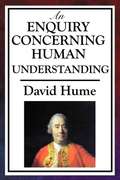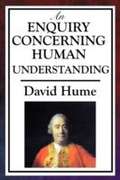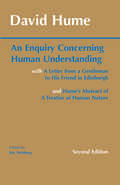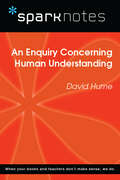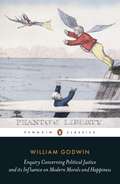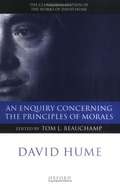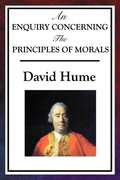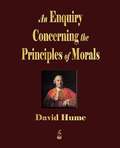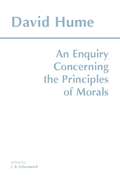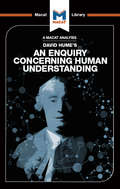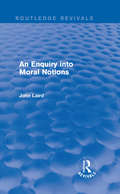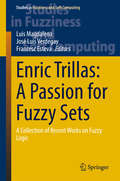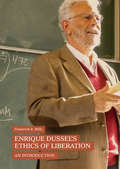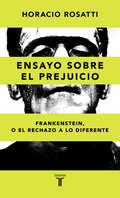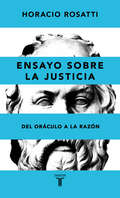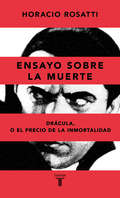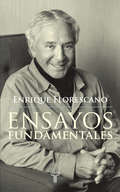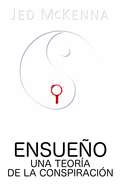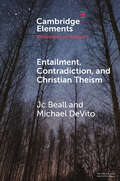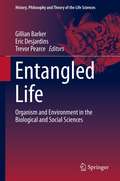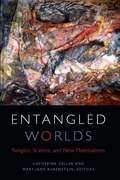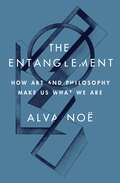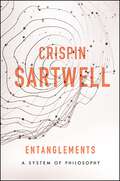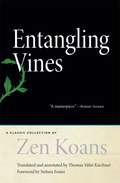- Table View
- List View
An Enquiry Concerning Human Understanding
by David HumeDavid Hume, an empiricist philosopher, takes on perhaps one of the most challenging of conceivable problems in An Enquiry Concerning Human Understanding. Moving beyond Descartes classic statement, I think, therefore I am, Hume addresses issues of knowing that fall outside the realms of active thought or incremental learning. While innumerable philosophers discuss various aspects of experience, Hume stands alone in his successful treatise on the nature of experience itself.
An Enquiry Concerning Human Understanding
by David HumeDavid Hume's philosophic work argues that causation does not really exist.
An Enquiry Concerning Human Understanding
by David HumeScottish empiricist and philosopher David Hume's follow up to "A Treatise Of Human Nature," this text discusses the limits of human understanding, the role of determinism within the context of free will and the unstable foundations of religion.
An Enquiry Concerning Human Understanding: with Hume's Abstract of A Treatise of Human Nature and A Letter from a Gentleman to His Friend in Edinburgh
by David Hume Eric SteinbergA landmark of Enlightenment thought, Hume's An Enquiry Concerning Human Understanding is accompanied here by two shorter works that shed light on it: A Letter from a Gentleman to His Friend in Edinburgh, Hume's response to those accusing him of atheism, of advocating extreme skepticism, and of undermining the foundations of morality; and his Abstract of A Treatise of Human Nature, which anticipates discussions developed in the Enquiry.In his concise Introduction, Eric Steinberg explores the conditions that led Hume to write the Enquiry and the work's important relationship to Book I of Hume's A Treatise of Human Nature.
An Enquiry Concerning Human Understanding (SparkNotes Philosophy Guide)
by SparkNotesAn Enquiry Concerning Human Understanding (SparkNotes Philosophy Guide) Making the reading experience fun! SparkNotes Philosophy Guides are one-stop guides to the great works of philosophy–masterpieces that stand at the foundations of Western thought. Inside each Philosophy Guide you&’ll find insightful overviews of great philosophical works of the Western world.
Enquiry Concerning Political Justice: And Its Influence On Morals And Happiness
by William GodwinOne of the great polemics and the key founding anarchist text, Godwin's Enquiry is his major work of political philosophy.Enquiry Concerning Political Justice established William Godwin as the chief exponent of British radicalism, in the tradition of the French Revolution. In it, he criticizes the 'brute engine' of government for systematizing oppression of individual liberty in the name of law and order, and calls for the abolition of all forms of rule and for the institution of an anarchist society based on the principles of simplicity, sincerity and equality. His book influenced everyone from Shelley and Coleridge (who revered him) to Thomas Malthus (who wrote his Essay on the Principle of Population in outraged response to him). The book's ideas would later echo through the writings of thinkers as diverse as Proudhon, Kropotkin, Marx and Thoreau, and it remains one of the great polemics of political literature.William Godwin, the famous philosopher and novelist, was born in East Anglia in 1756. The son of a Presbyterian minister, he was educated to follow in his father's footsteps, but subsequently lost his faith in God. He then devoted himself to writing, expounding his enlightenment and anarchist ideals in novels and essays. In 1797 he married Mary Wollstonecraft, the famous feminist; their daughter would grow up to be Mary Shelley, the author of Frankenstein. Godwin died in 1836. Isaac Kramnick is the Richard J. Schwartz Professor of Government at Cornell where he has taught since 1972. He has written or edited some twenty books among which his Bolingbroke and His Circle: The Politics of Nostalgia in the Age of Walpole won the Conference of British Studies Prize for best book on British politics.
An Enquiry Concerning Principles of Morals
by David Hume Tom L. BeauchampThis new volume in the Clarendon Hume series presents a definitive scholarly edition of one of the greatest works in the history of philosophy. In his elegant and lucid Enquiry Hume gives us an accessible presentation of a fully developed ethical theory. The distinguished Hume scholar Tom L. Beauchamp presents an authoritative text accompanied by introduction, annotation, glossary, biographical sketches, bibliographies, and indexes.
An Enquiry Concerning the Principles of Morals
by David HumeDavid Hume's An Enquiry Concerning the Principles of Morals argues that morals are not based in rational thought, but rather are sentimental endeavors. This text highlights how approval and disapproval can be used to make moral judgments, and how this might elevate certain aspects of society. Hume's book delves into the human psyche and, therefore, aids our understanding of society and life as a whole.
An Enquiry Concerning the Principles of Morals
by David HumeThe subject of the Enquiry is the contributions that moral sense and reason make in our moral judgments. Hume claims that moral sense makes the ultimate distinction between vice and virtue, though both moral sense and reason play a role in our formation of moral judgments. <P> <P> Reason is important when we have to make a judgment about what is useful, for reason alone can determine how and why something is useful to us or to others. Hume briefly addresses what moral judges usually include in their lists of virtues, what they leave out, and how they make these lists. He then returns to the classification of virtues he proposed first in the Treatise. <P> <P> Hume first distinguishes between artificial and natural virtues. Artificial virtues depend on social structures and include justice and fidelity to promises; allegiance; chastity and modesty; and duties of sovereign states to keep treaties, to respect boundaries, to protect ambassadors, and to otherwise subject themselves to the law of nations. Hume defines each of these virtues and explains how each manifests itself in the world. He notes that artificial virtues vary from society to society. <P> <P> Natural virtues, on the other hand, originate in nature and are more universal. They include compassion, generosity, gratitude, friendship, fidelity, charity, beneficence, clemency, equity, prudence, temperance, frugality, industry, courage, ambition, pride, modesty, self-assertiveness, good sense, wit and humor, perseverance, patience, parental devotion, good nature, cleanliness, articulateness, sensitivity to poetry, decorum, and an elusive quality that makes a person lovely or valuable. Some of these virtues are voluntary, such as pride, while others are involuntary, such as good sense. <P> <P> As in the Treatise, Hume explains that reason does not cause our actions. Instead, moral sentiments, or passions, motivate us to act. In the Enquiry, however, Hume goes further to state that our actions are caused by a combination of utility and sentiment. In other words, we must care about the outcome if we are to care about the means by which it is achieved. Several sections of the Enquiry are devoted to utility, the first and most important of the four kinds of virtue, which Hume calls “virtuous because useful.” He also addresses benevolence and its role in the moral process. Specifically, Hume says that benevolent acts are virtuous because they are useful to many others.
An Enquiry Concerning the Principles of Morals
by David Hume J. B. SchneewindA splendid edition. Schneewind's illuminating introduction succinctly situates the Enquiry in its historical context, clarifying its relationship to Calvinism, to Newtonian science, and to earlier moral philosophers, and providing a persuasive account of Hume's ethical naturalism. --Martha C. Nussbaum, Brown University
The Enquiry for Human Understanding
by Michael O'SullivanDavid Hume’s 1748 Enquiry Concerning Human Understanding is a modern philosophical classic that helped reshape epistemology – the philosophy of knowledge. It is also a classic of the critical thinking skills of analysis and reasoning. Analysis is all about understanding how arguments work and fit together. Having strong analytical skills helps to break down arguments, pull out the evidence on which they rely, and understand the kinds of implicit assumptions and reasons on which they work. Reasoning, meanwhile, means building and presenting arguments, forming well-structured, evidenced, and organised cases for a particular point of view. Hume applied his analytical skills to arguments about how humans know and understand the world, and how our minds work. At base, he was trying to analyse human reason itself – to show the workings and limitations of the human mind, and show the origins of our beliefs. Hume went on to apply his reasoning skills, creating an enduring argument about the nature of human knowledge. The result was one of the most striking and famous works in the history of philosophy.
An Enquiry into Moral Notions (Routledge Revivals)
by John LairdFirst published in 1935, this book compares and examines what John Laird termed the ‘three most important notions in ethical science’: the concepts of virtue, duty and well-being. Laird poses the question of whether any one of these three concepts is capable of being the foundation of ethics and of supporting the other two. This is an interesting reissue, which will be of particular value to students researching the philosophy of ethics and morality.
Enric Trillas: A Passion for Fuzzy Sets
by Luis Magdalena José Luis Verdegay Francesc Esteva(Preliminary) The book is a comprehensive collection of the most recent and significant research and applications in the field of fuzzy logic. It covers fuzzy structures, systems, rules, operations as well as important applications, e. g in decision making, environmental prediction and prevention, and communication. It is dedicated to Enric Trillas as an acknowledgement for his pioneering research in the field. The book include a foreword by Lotfi A. Zadeh.
Enrique Dussel’s Ethics of Liberation: An Introduction
by Frederick B. MillsThis book introduces the methodology and basic concepts of Dussel’s ethics of liberation. Enrique Dussel is one of the principal founders of the philosophy of liberation in Latin America. Frederick B. Mills discusses how, for Dussel, we can realize our co-responsibility for human life by responding, in accord with ethical principles, to the appeals of victims of the prevailing capital system. Mills shows how these principles, when subsumed in the political and economic fields, aim at overcoming the ongoing assault on human life and nature and provide a moral compass for forging a path to liberation. He makes the case that the study of Dussel is critical to the understanding of liberatory thought in Latin America today. This book aims to introduce the ethics of liberation to a broader audience in the Global North where Dussel's ideas are urgently relevant to progressive political and economic theory and praxis.
Ensayo sobre el prejuicio: Frankenstein, o el rechazo a lo diferente
by Horacio RosattiA través de un análisis minucioso en torno a la figura del monstruo nacido de la imaginación de Mary Shelley, este ensayo aborda el prejuicio ético que surge de la mirada estética, es decir, aquel que asimila lo bueno con lo bello y lo malo con lo diferente, lo marginal o lo desconocido. ¿Por qué tildamos malo o peligroso aquello que nos resulta feo, diferente o marginal, mientras que asumimos como valioso lo que goza de una apariencia agradable? Horacio Rosatti pone la lupa sobre el prejuicio, esa complejidad que revela nuestras contradicciones y nos impulsa a imaginar una sólida relación entre la moral y la estética. Y elige al monstruo creado por Mary Shelley como espejo capaz de cristalizar todos los sentidos de esa siniestra vinculación. Las hipocresías de la mirada social, el dificultoso proceso de adaptación de la criatura a un mundo de "distintos", las versiones cinematográficas y los productos de consumo mediante los cuales la sociedad ha procesado su existencia son algunos de los temas que analiza este ensayo fascinante, calibrado y provocador. En palabras del autor: "El monstruo siempre será un espejo. Aunque se trata de un espejo que refleja no solo lo que se ve, sino también lo que no se percibe a simple vista, lo que está escondido dentro de nosotros".
Ensayo sobre la justicia: Del oráculo a la razón
by Horacio RosattiAsistiremos al lugar y el momento exactos en que la consideración de la idea de justicia experimenta un giro radical y fundante en la historia de Occidente: de destino inexorable impuesto por los dioses a deliberación racional enteramente humana. La más singular perspectiva para recorrer uno de los conceptos de mayor relevancia de nuestra vida. Este libro nos sitúa en el lugar y el momento exactos en que la consideración de la idea de justicia experimenta un giro radical y fundante en la historia de Occidente: de destino inexorable impuesto por los dioses a deliberación racional enteramente humana. A fin de explorar la relación entre libertad, desobediencia y responsabilidad, el autor recobra las incómodas preguntas que tanto Antígona como Sócrates -dispuestos ambos a sacrificar su propia vida para sostener principios que estiman valiosos- se formulan sobre su circunstancia, preguntas que agrietan la idea de justicia de su época y que resuenan aun en la actualidad: ¿Qué tan libres somos para responder por nuestros actos? ¿Cuánto margen tenemos para desobedecer una ley que creemos injusta? ¿Qué relación existe entre la justicia y la verdad? Tercer y último volumen de la trilogía escrita para Taurus por Horacio Rosatti, Ensayo sobre la justicia ofrece la más singular perspectiva para recorrer uno de los conceptos de mayor relevancia de nuestra vida.
Ensayo sobre la muerte: Drácula, o el precio de la inmortalidad
by Horacio RosattiA partir de la figura de Drácula y sus diversas representaciones, este riquísimo ensayo explora las inquietudes sociales y culturales en torno al tema de la muerte; recobra los aportes de la filosofía, el derecho, la ciencia y el arte; plantea los caminos por los que hoy discurre la búsqueda de la inmortalidad y reflexiona sobre la incidencia de la tecnología en el logro de una vida humana cada vez más extensa. «Me enseñáis que este universo prestigioso y abigarrado se reduce al átomo, y que el átomo se reduce al electrón. Las líneas suaves de estas colinas y la mano del crepúsculo sobre este corazón agitado me enseñan mucho más.»Albert Camus, El mito de Sísifo El avance de la ciencia ha extendido el promedio de vida a niveles impensados. Paradójicamente, nuestros miedos se han desplazado del temor a la muerte al temor a los inconvenientes que nos depararía una existencia demasiado prolongada. ¿Habrá muerte en el futuro? ¿Es cierto que viviremos doscientos años? ¿Cómo será esa vida? ¿Podrá ser conjurada virtualmente la ausencia física de los seres que se han ido? ¿Qué significa hoy morir? ¿No respirar, no sentir, no pensar? Horacio Rosatti centra el análisis en la figura espectral del vampiro, ese ícono contemporáneo de la literatura y el cine capaz de subvertir los límites de lo biológico y lo moral que encarnaría tanto el miedo a la muerte como a la inmortalidad. La ausencia de un cuerpo que pueda reflejarse en el espejo o exponerse a la luz del día ¿no es, en su caso, el precio de vivir por siempre? Este riquísimo ensayo explora las inquietudes sociales y culturales en torno al tema de la muerte; recobra los aportes de la filosofía, el derecho, la ciencia y el arte; plantea los caminos por los que hoy discurre la búsqueda de la inmortalidad y reflexiona sobre la incidencia de la tecnología en el logro de una vida humana cada vez más extensa.
Ensayos fundamentales
by Enrique Florescano Francisco EissaEste libro homenaje recoge ocho ensayos esenciales del Dr. Enrique Florescano, renovador de la investigación histórica en México, que van desde su aproximación a los problemas agrarios de México, su investigación sobre la memoria mexicana y los mitos fundadores, hasta su reflexión sobre la historia como disciplina y el papel social del historiador.
Ensueño. Una Teoría de la Conspiración
by Jed McKenna Marisa Gonzalez AguiarSi la vida no es más que sueño, ¿a qué nos despertamos? La premisa central de Ensueño: Una Teoría de la Conspiración, es la verdaderamente ridícula pero indisputable afirmación de que el universo no existe. Esto es algo que se puede entender conceptualmente, como mirar un documental acerca de la Antártica, o experimentalmente, como mudarse a la Antártica. También existe un fenómeno relacionado en el cual te duermes mirando el documental y te despiertas en el páramo congelado. Eso debe ser extraño, pero la verdad es que estás dormido en un páramo desértico soñando que no lo estás, y eso es lo que te sucede cuando te despiertas.
Entailment, Contradiction, and Christian Theism (Elements in the Philosophy of Religion)
by Jc Beall Michael DeVitoApparent contradiction is common in traditional monotheism, and perhaps especially so in standard Christian theology given central doctrines such as the incarnation and trinity. This Element aims to chart out a very elementary but abstract framework through which such contradictions may be approached. This Element does not attempt to address the many options for thinking about contradictions in the face of logical entailment; it charts only a few salient abstract options.
Entangled Life: Organism and Environment in the Biological and Social Sciences
by Gillian Barker Eric Desjardins Trevor PearceThis volume explores the interactions between organisms and their environments and how this "entanglement" is a fundamental aspect of all life. It brings together the work and ideas of historians, philosophers, biologists, and social scientists, uniting a range of new perspectives, methods, and frameworks for examining and understanding the ways that organisms and environments interact. The volume is organized into three main sections: historical perspectives, contested models, and emerging frameworks. The first section explores the origins of the modern idea of organism-environment interaction in the mid-nineteenth century and its development by later psychologists and anthropologists. In the second section, a variety of controversial models--from mathematical representations of evolution to model organisms in medical research--are discussed and reframed in light of recent questions about the interplay between organisms and environment. The third section investigates several new ideas that have the potential to reshape key aspects of the biological and social sciences. Populations of organisms evolve in response to changing environments; bodies and minds depend on a wide array of circumstances for their development; cultures create complex relationships with the natural world even as they alter it irrevocably. The chapters in this volume share a commitment to unraveling the mysteries of this entangled life.
Entangled Worlds: Religion, Science, and New Materialisms (Transdisciplinary Theological Colloquia)
by Catherine Keller and Mary-Jane RubensteinHistorically speaking, theology can be said to operate “materiaphobically.” Protestant Christianity in particular has bestowed upon theology a privilege of the soul over the body and belief over practice, in line with the distinction between a disembodied God and the inanimate world “He” created. Like all other human, social, and natural sciences, religious studies imported these theological dualisms into a purportedly secular modernity, mapping them furthermore onto the distinction between a rational, “enlightened” Europe on the one hand and a variously emotional, “primitive,” and “animist” non-Europe on the other. The “new materialisms” currently coursing through cultural, feminist, political, and queer theories seek to displace human privilege by attending to the agency of matter itself. Far from being passive or inert, they show us that matter acts, creates, destroys, and transforms—and, as such, is more of a process than a thing. Entangled Worlds examines the intersections of religion and new and old materialisms. Calling upon an interdisciplinary throng of scholars in science studies, religious studies, and theology, it assembles a multiplicity of experimental perspectives on materiality: What is matter, how does it materialize, and what sorts of worlds are enacted in its varied entanglements with divinity? While both theology and religious studies have over the past few decades come to prioritize the material contexts and bodily ecologies of more-than-human life, Entangled Worlds sets forth the first multivocal conversation between religious studies, theology, and the body of “the new materialism.” Here disciplines and traditions touch, transgress, and contaminate one another across their several carefully specified contexts. And in the responsiveness of this mutual touching of science, religion, philosophy, and theology, the growing complexity of our entanglements takes on a consistent ethical texture of urgency.
The Entanglement: How Art and Philosophy Make Us What We Are
by Alva NoëWhy human nature is an aesthetic phenomenon—and why we need art and philosophy to understand ourselvesIn The Entanglement, philosopher Alva Noë explores the inseparability of life, art, and philosophy, arguing that we have greatly underestimated what this entangled reality means for understanding human nature.Life supplies art with its raw materials, but art, Noë argues, remakes life by giving us resources to live differently. Our lives are permeated with the aesthetic. Indeed, human nature is an aesthetic phenomenon, and art—our most direct and authentic way of engaging the aesthetic—is the truest way of understanding ourselves. All this suggests that human nature is not a natural phenomenon. Neither biology, cognitive science, nor AI can tell a complete story of us, and we can no more pin ourselves down than we can fix or settle on the meaning of an artwork. Even more, art and philosophy are the means to set ourselves free, at least to some degree, from convention, habit, technology, culture, and even biology. In making these provocative claims, Noë explores examples of entanglement—in artworks and seeing, writing and speech, and choreography and dancing—and examines a range of scientific efforts to explain the human.Challenging the notions that art is a mere cultural curiosity and that philosophy has been outmoded by science, The Entanglement offers a new way of thinking about human nature, the limits of natural science in understanding the human, and the essential role of art and philosophy in trying to know ourselves.
Entanglements: A System of Philosophy (SUNY series in American Philosophy and Cultural Thought)
by Crispin SartwellA work of maximally ambitious scope with a foundation in humility, Entanglements sets out a philosophical system of the sort rarely seen over the past century. In a discipline marked by greater and greater specialization and the narrowing of increasingly insular traditions and approaches, Crispin Sartwell has spent his career engaging widely across philosophical topics and texts. Here he brings together his philosophical positions in a unified system that is coherent across the issues and subdisciplines in the field. In addition to presenting his own theories of truth, knowledge, free will, beauty, and the political state, Sartwell's criticisms of other figures and movements provide an overview of the history of philosophy. The project of presenting an overarching philosophical system is a resolutely old-fashioned one, and in undertaking it, Sartwell is not only encapsulating an extraordinarily unique and productive career but also nudging philosophy back to its broader aims of explaining the world and our place in it.
Entangling Vines
by Thomas Yuho Kirchner Ueda Shizuteru Nelson FosterEntangling Vines, a translation of the Shumon kattoshu, is one of the few major koan texts to have been compiled in Japan rather than China. Indeed, Kajitani Sonin (1914 - 95), former chief abbot of Shokoku-ji and author of an annotated, modern-Japanese translation of the Kattoshu, commented that 'herein are compiled the basic Dharma materials of the koan system." Most of the central koans of the contemporary Rinzai koan curriculum are contained in this work. A distinctive feature of Entangling Vines is that, unlike The Gateless Gate and Blue Cliff Record, it presents the koans "bare," with no introductions, commentaries, or verses. Its straightforward structure lends the koans added force and immediacy, emphasizing the Great Matter, the essential point to be interrogated, and providing ample material for the rigors of examining and refining Zen experience. Containing 272 cases and extensive note material, the collection is indispensable for serious koan training and will also be of interest for anyone drawn to Zen literature. The present translation had its origins in the discussions between three forward-looking modern Japanese Zen masters and Thomas Kirchner, an experienced Zen monk from America. And Kirchner's careful annotation of each koan makes this a brilliant introduction to Buddhist philosophy.
